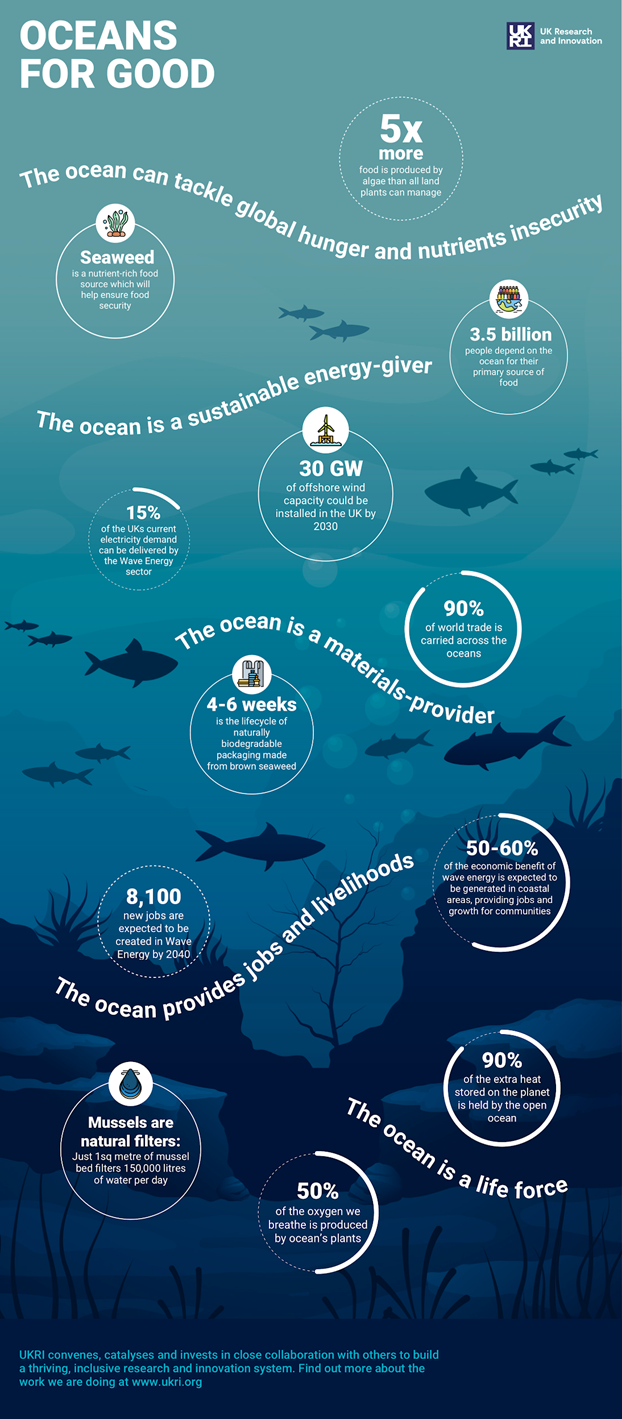Oceans for Good
We, as a species, are reliant on the ocean. Discover why the ocean is such an important asset - providing jobs, a wealth of biodiversity, and sustainable energy. Featuring an infographics by UKRI as a part of their Oceans for Good campaign.
Oceans for Good
Oceans cover more than two-thirds of the Earth’s surface and are home to an incredible variety of life. They are the lifeblood of the planet, playing a crucial role in moderating the Earth’s climate, regulating global temperature and weather patterns, and helping to stabilise the Earth’s rotation and gravitational field.
Oceans are directly related to the carbon dynamics on Earth. They play an integral part in the global cycle, acting as carbon dioxide absorbers and capturing around 25% of all greenhouse gas emissions that are released into our atmosphere.
Oceans are also essential to human life, providing materials, jobs, recreation and food for over 1 billion people worldwide. Despite their significance, our seas are in grave danger. Overfishing, pollution, and climate change are all taking their toll on seawater temperature and acidity levels, with far-reaching consequences for life on Earth.
In time for post-COP26 conversations on climate targets, UK Research and Innovation (UKRI) has published an ‘Oceans for Good’ infographic illustrating the many benefits and resources we can glean from our blue planet.
The infographic statistics are derived from the Wave Energy Innovation Position Paper and the Plymouth Marine Laboratory.

The healing power of our blue planet
Some key statistics highlighted by the infographic include;
- 30GW of offshore wind capacity could be installed in the UK by 2030
- 50-60% of the economic benefit of wave energy is expected to be generated in coastal areas, providing jobs and growth for coastal communities
- 5 billion people depend on the ocean as their primary source of food
- 90% of the extra heat stored on the planet is held by the open ocean
The ocean is a sustainable energy-giver
Renewable energy is crucial for the future of our planet. Not only does it reduce our reliance on fossil fuels, but it also helps mitigate climate change. Offshore wind farms are becoming an increasingly popular way to generate renewable energy and power the world.
The cost of offshore wind has reduced in recent years, and with continued advancements in technology, it is poised to become a major player in the global energy mix. Offshore wind offers a number of advantages over other forms of renewable energy, including greater reliability and higher capacity factors. It is also less affected by weather conditions, making it a more consistent source of power.
Clean energy from wind is a step towards a greener future, however, offshore wind developments are being hindered by the explosive remnants of past conflict. These remnants, including conventional unexploded ordnance left behind from wars as well as dumped chemical munitions for example. All still pose a risk to workers and the environment.
The ocean contains a wealth of biodiversity
The ocean is the largest and most diverse ecosystem, holding over 97% of all water on Earth. Filled with an incredible assortment of life, hosting a myriad of microscopic organisms, invertebrates and vertebrates that have adapted to life in the ocean’s depths.
Half of the world's fish species and a quarter of all marine mammals and plants live in the deep blue sea, with 1,000 species per m² found on some tropical coral reefs alone. Despite this, we know very little about them. There are still millions of yet-to-be-discovered creatures in its depths, with 91% of all species in our blue planet still awaiting description.
Protecting our marine ecosystems
Environmental concern has grown increasingly urgent in recent years, and the preservation of marine life is of paramount importance. A topic of interest is the safeguarding of marine ecology when dealing with the disposal of explosive devices submerged deep within the oceans.
Ordnance that has failed to explode as designed - despite many laying dormant for decades - contains high-level explosives, posing significant risk. They must be disposed of safely.
The marine environmental campaign, Stop Sea Blasts, supports low-order deflagration to dispose of subsea explosives. It focuses on concerns that blowing up unexploded ordnance at sea harms marine ecology and aquatic life and instead strives to make disposal as safe as possible, reducing collateral damage.
Our mission
SafeLane Global detects conventional unexploded ordnance and chemical munitions in any marine environment – offshore, inshore and nearshore.
Our marine team has an in-depth understanding of subsea engineering, oceanology, and marine physics. This expert knowledge enables us to design appropriately considerate solutions to overcome challenges in all environments.
Our mission is to enable the safe and sustainable realisation of our commercial, governmental and humanitarian clients’ ambitions and aspirations.
Discover our latest news stories here.
Find out how we can help you


